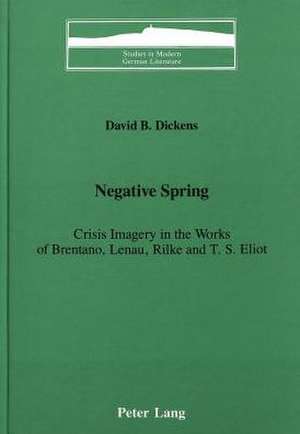Negative Spring: Studies in Modern German Literature,, cartea 24
Autor David B Dickensen Limba Engleză Hardback – 30 noi 1988
Preț: 255.35 lei
Preț vechi: 272.72 lei
-6% Nou
Puncte Express: 383
Preț estimativ în valută:
48.86€ • 51.01$ • 40.44£
48.86€ • 51.01$ • 40.44£
Carte indisponibilă temporar
Doresc să fiu notificat când acest titlu va fi disponibil:
Se trimite...
Preluare comenzi: 021 569.72.76
Specificații
ISBN-13: 9780820407357
ISBN-10: 0820407356
Pagini: 242
Dimensiuni: 225 x 156 x 18 mm
Greutate: 0.42 kg
Editura: Peter Lang Gmbh, Internationaler Verlag Der W
Seria Studies in Modern German Literature,
ISBN-10: 0820407356
Pagini: 242
Dimensiuni: 225 x 156 x 18 mm
Greutate: 0.42 kg
Editura: Peter Lang Gmbh, Internationaler Verlag Der W
Seria Studies in Modern German Literature,
Cuprins
Contents: 17th-century origins of 'negative spring'; its appearance in works by Brentano, Lenau, Rilke, and T. S. Eliot. Is there a conscious tradition behind the attitude or are similar formulations in various poets' works merely similar subconscious responses? This book is the first to examine this attitude in depth and to regard it as more than isolated individual phenomena.
Recenzii
Negative Spring... is a meticulous, painstakingly researched attempt to analyze the striking poetic image of negative spring as an articulation of despair in selected works by Gryphius, Lenau, Brentano, Eliot, Rilke, and other European writers since the seventeenth century... Dickens' pursuit of the question of conscious influence versus unconscious tradition yields much that is useful to any comparatist or Germanist. (Klaus Phillips, Hollins College)














